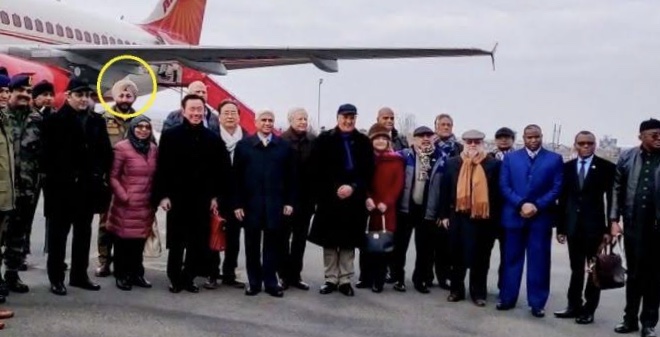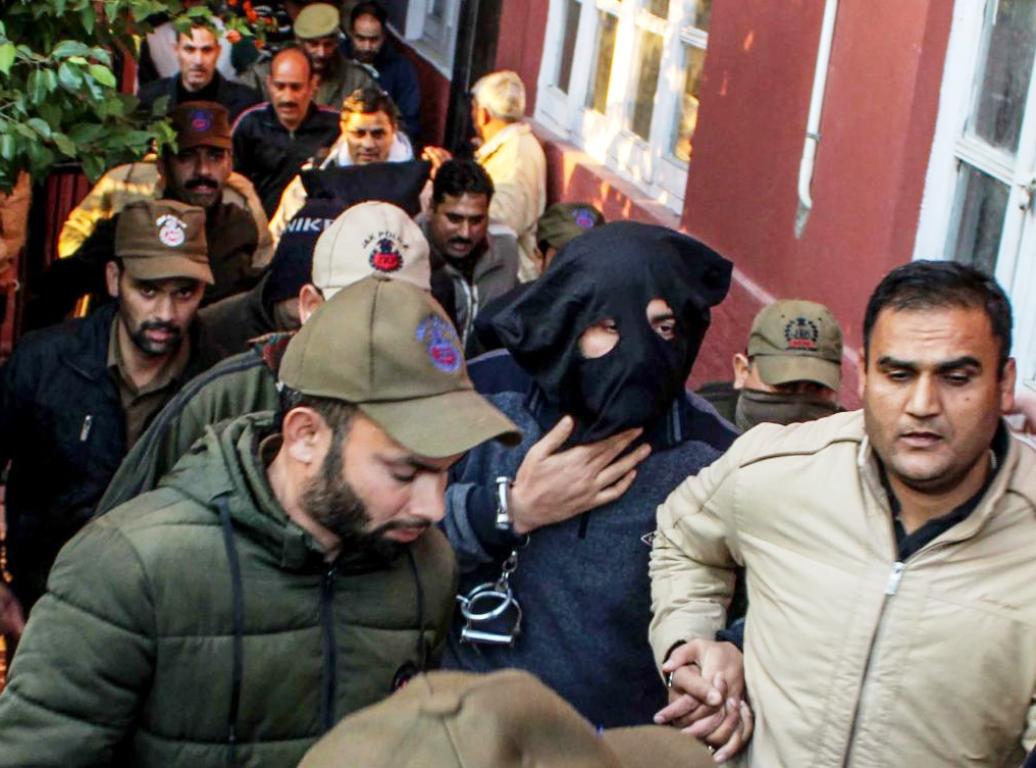The police officer who was arrested along with militants early this year is back to news after the investigators filed a formal charge sheet. The details revealed in the police document and the information already in the public domain makes the former officer an interesting character

The erstwhile darling of Kashmir counter-insurgency, Davinder Singh, the DySP rank police officer who was arrested with top militant on January 11, 2020, has now been accused of being a Pakistani agent. The charge-sheet that the federal investigator, the National Investigations Agency (NIA) filed against him in a designated court at Jammu said the former officer “was being groomed by Pakistani officials for obtaining sensitive information” and he was in touch with Pakistani embassy officials in Delhi using “secured social media platforms”.
The charge sheet has identified the Pakistani official as Shafaqat, who was repatriated to Pakistan in June when Delhi downgraded the mission staff.
“Investigation has also revealed that the accused were obtaining weapons and ammunition from across the border with the help of arms smugglers and accused Davinder Singh. These weapons were later used for terrorist activities,” The Telegraph reported. The co-accused in the case includes a law school drop-out Irfan Shafi Mir and a police deserter, Naveed Babu. The NIA has accused Singh of arranging a safe house for Naveed in Jammu to shield him from “heightened surveillance of security agencies”.
The charge sheet has accused Singh of sheltering militants, helping them secure weapons and being in touch with the Pakistani officials. The charge-sheet mostly details the exploits of the militant Naveed, a police deserter, and Mir, a law school drop-out.
Singh is cooling his heels in the Hiranagar (Kathua) jail. Earlier, the
UT administration rejected his plea that his services in the Jammu and Kashmir Police should be regularized as a DySP from the day he assumed the charge. The joint plea by “Singh and seven other officers”, apparently moved before his arrest, was rejected on basis of the fact that Director General Police lacks competence “to order placements as in-charge DySPs” and that “out-of-turn promotion can be given only once in the entire service career”. These officers posted as DySPs from 1999 to 2001 were actually appointed as sub-inspectors and were promoted out-of-turn for their ‘outstanding’ performance in the counter-militancy special operation group (SOG).
Singh’s colleagues, however, said that he had almost completed his services. “I think barely a year was left in his retirement when this episode happened,” one of his erstwhile subordinates said.
Raids and Arrests
The NIA, in its charge-sheet, has detailed the process of investigations including the raids it carried out.
In February, the agency flew score odd officials led by DIG Sonia Narang that raided a number of places in South Kashmir. The sleuths raided a Darul-Uloom, a seminary, in Pinglana (Pulwama) where they confiscated some documents; the house of an IPS officer, whose brother Shams ul Haq died as an active militant; questioned an OGW, Farooq Ahmad Thokar; searched militant Omar Dhobi’s home in Shopian and later shifted to north Kashmir where also a series of raids were carried out including the home of a power department employee, Fayaz Mir. Even a BJP Sarpanch’s home, Mir Tariq was raided.

Earlier, they had arrested a LoC trader, Tanveer Ahmed Wani, a resident of Malder in Shopian, after summoning him to Delhi. The arrest was the outcome of the revelations that Hizb militant, Naveed Babu had made about his funding, media reports from Delhi suggested. During all these raids, the NIA had seized a laptop, two mobile phones, two pen-drives and five passports. Singh’s ancestral home in Averigund Tral was also raided.
NIA took over Singh’s case within days after his highway arrest on January 11. The arrest led to the recovery of an AK-47 assault rifle, three pistols, five hand grenades, 174 live rounds of AK-47 and 36 live rounds of pistol and other incriminating material on the basis of which FIR No 05/2020 under sections 18, 19, 20, 38 and 39 of Unlawful Activities Prevention Act, section 7/25 of Arms Act and section 3/4 of Explosive Substances Act was registered with the Police Station Qazigund. Later, the NIA flew all the accused to Jammu on January 23. They were initially kept in the remand at Kotbalwal jail and later, Singh was sent to Hira Nagar jail. He had pleaded before the court that his detention at Kot Balwal is a threat to his life because he will have to live with some of the militants whom he had arrested earlier.
All others in the case including Syed Naveed Mushtaq alias Naveed Babu, his brother Syed Irfan, close associate Rafi Ahmed Rather and Irfan Shafi Mir, stand detained in Kot Balwal. Irfan, Babu’s brother was summoned from Punjab and arrested. NIA investigations suggested that the brothers were in touch and Irfan was actually trying to find some accommodation in Chandigarh for Babu’s winter recess.
Even the CRPF did a “massive internal audit” of its personnel involved with the counter-insurgency to check if there is any “attempt of subversion”. Quickly after Singh’s arrest, the security of the airports in Jammu and Kashmir was shifted to the CISF.
Parliament Attack Case
The case generated interest for diverse reasons. For Kashmir, it was the parliament attack of 2002 that brought India and Pakistan to a war that dominates the debate. Though the Kashmir Police Chief, Vijay Kumar told reporters that they will be asking Singh about the case, it is not known if there has been any forward movement.
In the days after Singh’s arrest, an Open Magazine report went viral. After the parliament attack, it said, SM Shangari, the then police commissioner of Thane district has identified the assailants in the parliament case as ones whom his team had arrested from Mumbra city. “He had spotted similarities between the blueprints, maps, arms, and ammunition seized from the four arrested Mumbra and the material recovered from the bodies of the parliament attackers in New Delhi,” the report says. “The commissioner wanted to check if the killed militant was the same man they had arrested.”
“Shangari said the four militants arrested by the police had been handed over to the Jammu and Kashmir Police on December 8, 2000, on the orders of the Thane District Court via a transit remand, since they were wanted for other cases in Kashmir. But former Director-General of Jammu and Kashmir Police K Rajendra, who was heading the SOG in 2001, however, dismissed Shangari’s inquiries calling it a case of mistaken identity,” the report said. But the four men sent on remand to Kashmir police were never returned to Thane, even though they were on transit remand.
Even post-Parliament attack, Singh did figure again. “Davinder Singh’s name had again cropped in a July 2005 case, when Delhi Police arrested Haji Ghulam Moinuddin Dar, an alleged militant, on the outskirts of the Indian capital,” Iftikhar Gilani wrote in a feature for Turkish news agency. “Police recovered a pistol, a wireless set and a letter signed by Davinder Singh, asking security agencies to facilitate Dar’s safe passage. But Delhi Police in order to confirm the authenticity of the letter went to Srinagar, where they raided Singh’s official residence recovering an AK rifle and ammunition. Even though all these details are part of the charge sheet filed by Delhi Police, Singh was never probed further.”
Sleaze and Scotch
Apart from 3500 contacts, India Today TV website reported that Singh’s cell phone carried “a huge amount of obscene content and sleazy pictures”. During the fortnight-long interrogation, Kamaljit Kaur Sandhu reported in the “greedy side” of the police officer on basis of the records and the materials seized during weeklong raids at his residence and other places. Quoting NIA sources the media outlet termed Singh as a “lone wolf”, who was “acting on his own and not working for any intelligence agency”. His cell phone messages indicated a “complicated lifestyle”.
“Besides regular consumption of alcohol, NIA sources said their team “discovered his liaison with over a dozen women”,” the India Today reported. “He is said to have “spent lavishly on his several affairs”. He is a self-admitted ‘sex addict’ where he regularly took little blue pills (viagra).”
The report said that Singh’s “need for money” increased over the years as he required “exorbitant amounts” to sustain his lifestyle. It termed him a “playboy” who was falling short of money to sustain his lifestyle.
These reasons, the report said, led him to have a Rs 40 lakh pact with Hizbul Mujahideen for assisting the trio in reaching Jammu, to his safe house till they could escape to Pakistan in two months. He had done the same thing in 2019, a service for which he had taken Rs 12 lakh in cash and some white goods including a LED TV. Interestingly, his flight back home in early 2019 from Jammu was paid by Irfan Mir, who was also captured along with Singh and Babu and is being termed as a “law school dropout”.
A Police Biradari
Some media report suggests that Irfan was no less a catch. The Economic Times reported that he was arrested in 2018 but was set free “allegedly at the behest of intelligence agencies.” Terming him to be the “real conduit”, Rahul Tripathi reported that he was in touch with an array of intelligence agencies operating in the Valley given “his proximity to both the J&K police and Hizbul Mujahideen.”
“Irfan’s complex network of police and militant contacts trace their roots to his father Mohd Shafi Mir, who was a constable with J&K police. He later joined HM at the peak of militancy in the 1990s. He was killed by security forces, said a home ministry official,” the report said. “However, Irfan’s father had apparently developed a close association with HM chief Syed Salahuddin, which later helped Irfan gain access to HM cadres. Just the same way his father’s police background allowed him to develop close contacts among cops and through them intelligence officials. Singh was probably one among them, said sources.” Irfan had been a frequent visitor to Pakistan.
Even the charge sheet talks in detail about Mir’s contacts. He was supposed to be having an allocation of two seats in Pakistani medical colleges. However, Mir, according to media reports had not been able to fill the two seats.
SIM Card
Interestingly, the arrest was planned after the police heard Babu talking about his departure to Jammu. Even the phone had a police connection, according to a new report. Babu had been on police radar from the day he deserted the police force.
“In recent months, a postpaid SIM card was supplied to him through a very circuitous route with an aim to track his movements. But he never used it. Police officials in Shopian were monitoring the mobile phone number constantly,” Anando Bhakto reported in The Frontline. “However, on the day of Davinder Singh’s arrest, this number suddenly became active and Naveed Babu made a call, most likely to talk to his brother. It was suspected that he had communicated in a coded language that he was going to travel somewhere. This number was immediately put on constant surveillance and soon the police found out that Naveed Babu was travelling along the highway southwards from Shopian.”
Guru Reference
All these masala things, however, are not part of the charge sheet. Nobody knows if the news reports about Singh were incorrect or the investigators avoided making a reference to them. It is also possible that Singh had more stuff than what the sleuths could chew.
Now Singh case is being used as a reference by the people fighting against capital punishment. They are citing it as a case in which the subsequent investigations have proved the basic charges had severe infirmities.
“Then there are instances such as the recent arrest of Davinder Singh, after which new questions are emerging about whether Afzal Guru was actually guilty — albeit too late, after his hanging,” Delhi High Court lawyer, Abraham C Mathews, wrote in Money Control in an opinion piece It’s an irony when death penalty saves lives. “All these instances show that with the present state of our law enforcement, as well as judiciary at all levels, there can rarely be conclusive proof of guilt that is sufficient to condemn any person irreversibly to death.”















